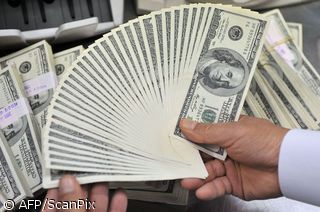A federal judge ruled that Microsoft should be broken into two companies, a decision that could radically tilt the balance of power in the technology industry.
Published:
8 June 2000 y., Thursday
U.S. District Judge Thomas Penfield Jackson decided that Microsoft could retain its operating systems for PCs, TV set-top boxes, handheld computers and other devices. But the company would be forced to create a separate firm for its other software and Web products--such as Outlook, Internet Explorer, BackOffice and the Microsoft Network (MSN)--resulting in sweeping changes from corporate offices and homes to the entire Internet.
In addition to the breakup, Jackson imposed restrictions on Microsoft's business practices that go into effect in 90 days unless an appeals court blocks the action. Microsoft said it will immediately appeal the ruling. As part of a strongly worded decision, Jackson said the court "has reluctantly come to the conclusion...that a structural remedy has become imperative: Microsoft as it is presently organized and led is unwilling to accept the notion that it broke the law or accede to an order amending its conduct." He added that Microsoft "continues to do business as it has in the past and may yet do to other markets what it has already done to the PC operating system and browser markets."
Jackson also said Microsoft has "proved untrustworthy in the past." He said Microsoft should not be surprised by the ruling, either. According to Jackson, Microsoft had sought "months of additional time" in further hearings regarding a breakup.
The decision effectively marks the end of a bitter two-year trial that exposed Microsoft's hardball business tactics. But the case is far from over: Microsoft immediately said it will appeal, which could tie up the case for two or more years.
"This is the beginning of a new chapter in this case," Microsoft chairman Bill Gates said in a videotaped response. "We will be appealing this decision, and we have a very strong case on appeal.
Copying, publishing, announcing any information from the News.lt portal without written permission of News.lt editorial office is prohibited.
The most popular articles
 The EBRD is supporting the modernisation of transport infrastructure in Serbia with a €150 million sovereign loan to finalise the construction of a new motorway section along the strategic Corridor X.
more »
The EBRD is supporting the modernisation of transport infrastructure in Serbia with a €150 million sovereign loan to finalise the construction of a new motorway section along the strategic Corridor X.
more »
 The Executive Board of the International Monetary Fund (IMF) today completed the first review of Romania’s economic performance under a program supported by a 24-month Stand-By Arrangement (SBA).
more »
The Executive Board of the International Monetary Fund (IMF) today completed the first review of Romania’s economic performance under a program supported by a 24-month Stand-By Arrangement (SBA).
more »
 The Executive Board of the International Monetary Fund (IMF) today approved a three-year, SDR 13.57 million (about US$21.5 million) arrangement under the Poverty Reduction and Growth Facility (PRGF) for the Union of the Comoros.
more »
The Executive Board of the International Monetary Fund (IMF) today approved a three-year, SDR 13.57 million (about US$21.5 million) arrangement under the Poverty Reduction and Growth Facility (PRGF) for the Union of the Comoros.
more »
 The Executive Board of the International Monetary Fund (IMF) today completed the second review of Mongolia's economic performance under a program supported by an 18-month Stand-By Arrangement (SBA).
more »
The Executive Board of the International Monetary Fund (IMF) today completed the second review of Mongolia's economic performance under a program supported by an 18-month Stand-By Arrangement (SBA).
more »
 Parex banka has established a subsidiary, SIA NIF (“Nekustamo īpašumu fonds”, or “Real Estate Fund”), which will professionally manage assets that are not related to the Bank’s core business.
more »
Parex banka has established a subsidiary, SIA NIF (“Nekustamo īpašumu fonds”, or “Real Estate Fund”), which will professionally manage assets that are not related to the Bank’s core business.
more »
 In his address at the Lithuanian-Belarusian Business Forum “Belarus and Baltic States: new prospects for cooperation”, Prime Minister Andrius Kubilius has pointed out that Lithuania sees Belarus as creating its future in Europe...
more »
In his address at the Lithuanian-Belarusian Business Forum “Belarus and Baltic States: new prospects for cooperation”, Prime Minister Andrius Kubilius has pointed out that Lithuania sees Belarus as creating its future in Europe...
more »
 JDRF Employs VoIP and Web-Based Video Collaboration Enabled by Cisco for More Effective Teamwork Among Employees and Constituents.
more »
JDRF Employs VoIP and Web-Based Video Collaboration Enabled by Cisco for More Effective Teamwork Among Employees and Constituents.
more »
 On 16 September 2009, AB Bank SNORAS group finished the transaction during which it purchased from AB “Invalda” with its own funds 100 per cent of the shares of AB “Finasta įmonių finansai”, managing AB Bank “Finasta”.
more »
On 16 September 2009, AB Bank SNORAS group finished the transaction during which it purchased from AB “Invalda” with its own funds 100 per cent of the shares of AB “Finasta įmonių finansai”, managing AB Bank “Finasta”.
more »
 Federal Reserve Chairman Ben Bernanke that the worst U.S. recession since the Great Depression was probably over, but the recovery will take time.
more »
Federal Reserve Chairman Ben Bernanke that the worst U.S. recession since the Great Depression was probably over, but the recovery will take time.
more »
 Growth expected to return in the second half of 2009. Forecasts are still uncertain but fears of a severe, prolonged recession are fading.
more »
Growth expected to return in the second half of 2009. Forecasts are still uncertain but fears of a severe, prolonged recession are fading.
more »